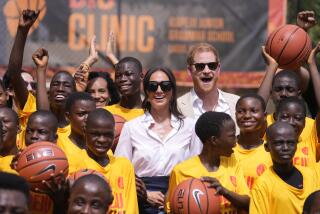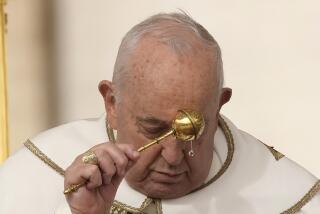Pope Calls for Tolerance in Nigeria
- Share via
ABUJA, Nigeria — Pope John Paul II, the first prominent visitor in years to a nation widely scorned for its harsh repression of dissent, urged Nigeria’s military rulers Saturday to free about 60 prisoners and to “guarantee respect for human life and for human rights.”
The Roman Catholic leader coupled his criticism with praise for Nigeria’s peacekeeping efforts in West Africa, including an armed intervention last month that booted out a military junta and restored elected leaders in neighboring Sierra Leone.
Although John Paul arrived here for a three-day visit primarily to beatify a Nigerian monk, his remarks echoed his crusading mission two months ago to another pariah state, Cuba, where he appealed for a more tolerant political climate and won freedom for 299 detainees of Fidel Castro’s Communist regime.
“In your own country, you are all called to muster your wisdom and expertise in the difficult and urgent task of building a society that respects all its members and their dignity,” the pope said during a welcoming ceremony led by Gen. Sani Abacha, who seized control of sub-Saharan Africa’s richest and most populous nation five years ago.
“This requires an attitude of reconciliation and calls for the government and citizens of this land to be firmly committed to giving the best of themselves for the good of all,” he added.
Later, as John Paul pressed his human rights campaign in a private meeting with the 54-year-old general, the Vatican handed a list of prisoners to Nigeria’s foreign minister and urged their release as “an act of clemency on humanitarian grounds.”
Abacha’s regime gained notoriety in 1995 for hanging author Ken Saro-Wiwa and eight other minority rights activists. It has condemned other opponents to prison terms of up to 25 years and practices severe press censorship. Amnesty International counts 200 political prisoners here, including pro-democracy activists, human rights lawyers, journalists and former politicians.
The prisoner list submitted by the Vatican secretary of state, Cardinal Angelo Sodano, was compiled from appeals by international agencies, foreign governments and prisoners’ relatives. It covers “all the names well known to the public,” papal spokesman Joaquin Navarro-Valls said.
That, presumably, means it includes Muslim tycoon Moshood Abiola, the apparent winner of Nigeria’s 1993 presidential election. Abacha seized the presidency after nullifying the election results and jailing Abiola.
Lt. Gen. Jeremiah Useni, the Cabinet minister in charge of this federal capital, said that Abacha would “respond appropriately” to the Vatican request. Observers said they expected that some prisoners not regarded as security threats by the regime will be freed, probably after the pope’s departure.
But as he stood in black civilian clothes at the white-robed pontiff’s side, Abacha sounded intent on reaping immediate benefit from the papal visit.
*
The general, who has promised to hold a presidential election in August and is an all-but-declared candidate himself, said the pope arrived “at a very critical moment in the implementation of our transition program.”
“The government and people of Nigeria strongly support the global campaign against injustice, poverty, dictatorships and unregulated capitalism which your papacy has initiated,” he told his guest, who was sheltered by a canopy from the 95-degree heat and from sand blown across the airport tarmac by a gentle desert wind.
Abacha laid on a full military greeting, complete with cannon salutes and a 100-piece army band, for the only renowned head of state ever to visit him. Thousands of flag-waving schoolchildren lined a 25-mile route to cheer John Paul in his plexiglass-covered popemobile.
Later, after a 30-minute private meeting, Abacha beamed for cameras while introducing his wife and six children to the 77-year-old pope, who was leaning on an ebony and ivory cane given to him by the Nigerian leader.
Abacha, himself a member of Nigeria’s Muslim majority, said that people of all faiths welcomed the pope as a unifying moral leader. And the emotional greeting given John Paul clearly came from others besides Nigeria’s Catholics, who number 12 million in a population of 104 million.
“I feel so overwhelmed,” said Dozie Okwuosah, a supervisor at Nigeria’s Central Bank, watching John Paul’s slow descent from his charter jet. “We really need the pope in the country at this time, to help turn around the hardships we are facing.”
One of the world’s major oil exporters, Nigeria is nevertheless mired in economic mismanagement, corruption, poverty and crime. The government spent an estimated $450,000 on the papal visit.
*
Judging from the coverage on state television, Abacha reaped a propaganda windfall.
Throughout the live telecast of the welcoming ceremony, one Nigerian commentator praised Abacha as a crusader for “love, peace and hope,” a statesman trying to stabilize Nigeria and West Africa.
John Paul chimed in with praise for Nigeria’s leadership of the West African peacekeeping force that intervened to reverse an anti-democratic coup in Sierra Leone and rescued priests and nuns who were trapped inside a Catholic pastoral center by fighting in that country.
“Blessed are the peacemakers,” he said. “I duly recognize the contributions made by Nigeria and other countries to help in this difficult situation.”
The peacekeeping force is an arm of the Nigerian-led Economic Community of West African States. In 1990, it intervened to end a civil war in neighboring Liberia.
Some observers believe that Abacha’s motives for reinstating Sierra Leone’s elected president were purely self-serving; in their view, the Nigerian was seizing an opportunity to pose as a crusader for democracy and sending a signal to anyone who might challenge him at home if he wins election as a civilian. Also, these observers said, Nigeria is interested in laying its hands on Sierra Leone’s diamonds.
Nigeria does have legitimate reasons for stability in the region. Any upheaval in West Africa could have devastating financial repercussions here. The country cannot afford a flood of war refugees across its borders.
The U.N. Security Council has praised Nigeria’s role in Sierra Leone. The United States, reluctant to send its own troops to Africa, praised the Nigerian army’s safe evacuation of Americans and other foreigners from Sierra Leone.
More to Read
Sign up for Essential California
The most important California stories and recommendations in your inbox every morning.
You may occasionally receive promotional content from the Los Angeles Times.














